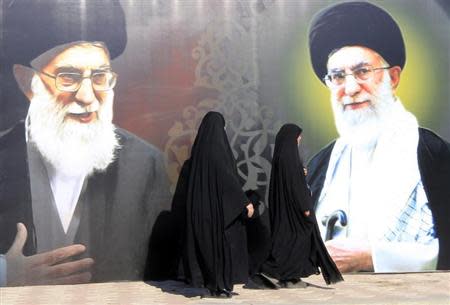Iran's Khamenei backs nuclear talks but not optimistic

By Mehrdad Balali DUBAI (Reuters) - Iran's supreme leader vowed to continue nuclear talks resuming with world powers on Tuesday despite some reservations, in his strongest sign of support for moderate President Hassan Rouhani's push to resolve the conflict peacefully. Iranian negotiators will hold a second round of talks with the United States and five other world powers in Vienna aimed at a definitive settlement of the dispute, which led to global economic sanctions against Iran. Tuesday's talks look to build on an earlier interim accord binding Iran to suspend some sensitive parts of its uranium enrichment in return for modest sanctions relief. "What our officials started will continue. We will not renege. I have no opposition," said Ayatollah Ali Khamenei to a crowd in northern city of Tabriz on Monday. "But I will say again: there is no use . . . it will not lead anywhere." U.S. and its Western allies suspect Iran of trying to develop atomic weapons, a charge Tehran has steadfastly denied, insisting that its nuclear programme is peaceful. The initial deal, reached in Geneva last November, angered Islamic hardliners who accused the government of selling out to the West by making concessions on a matter of national pride. Khamenei, whose powers transcend all others in the Islamic republic, stopped short of endorsing the hardliners' charges but warned moderates not to get carried away with talk of better ties with traditional arch-foe, the United States. Parliamentary speaker Ali Larijani said a deal was still within reach, despite problems between Tehran and Washington, if the Vienna talks remained focused on the nuclear issue. "We must find a deal," Larijani told French daily Le Figaro. "It's possible, on the condition that we don't add other topics to the agenda in Vienna like the question of our ballistic missiles, which the Americans say they want to examine." WARNING AGAINST U.S. Tehran and Washington haven't had official ties since after the 1979 Islamic revolution that toppled the U.S.-backed Shah, and Khamenei has vetoed any initiative for rapprochement. "Don't try to dress up America and erase its past record of terror, violence and ugliness," Tasnim news agency quoted Khamenei as saying. "The nuclear issue is just a hype. American officials are already raising other issues like human rights and missile threat." Iran's deteriorating economy and President Rouhani's landslide election in June has revived efforts to reach out to the West in hopes of easing tension and drawing badly-needed foreign investment. Foreign Minister Mohammad Javad Zarif, who leads the Iranian delegation at the negotiations, told Iran's official news agency IRNA before leaving for Vienna that "the path will continue and will bear results, even without U.S. support. If it doesn't succeed, everything will revert to the old ways... "Under the present circumstances, (our) talks with America are solely on the nuclear matter, but we have no fear about addressing other issues," he said, referring to bilateral ties with Washington. Zarif, who has been singled out for attacks by hardliners, said he had full mandate to pursue negotiations with the five nuclear powers United States, Russia, China, France and Britain plus Germany according to guidelines set by the leader. "We don't have to pause at every step and ask for permission," he said. (Reporting by Michelle Moghtader, writing by Mehrdad Balali, editing by Sami Aboudi and Tom Heneghan)

